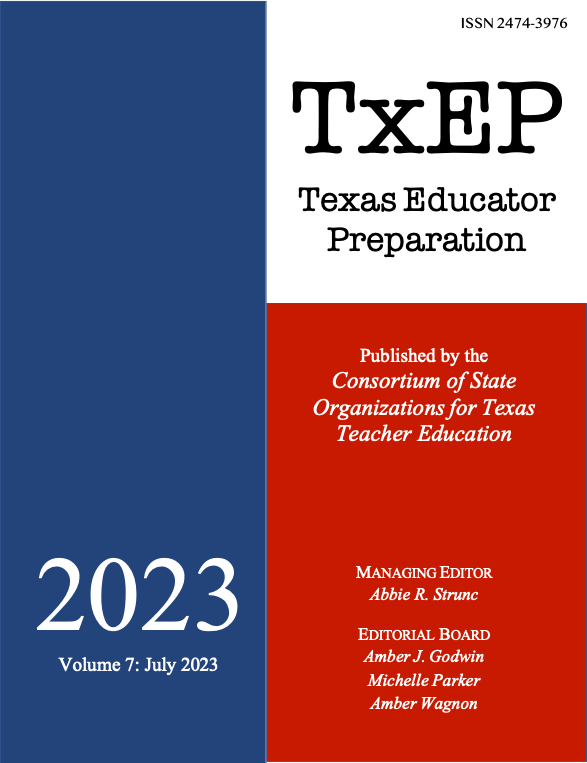Texas Literacy Collaborative for Educator Preparation: A Faculty-Led Initiative for Preparing Teachers of Reading
DOI:
https://doi.org/10.59719/txep.v7i1.1Keywords:
literacy educator preparation, faculty collaboration, Science of Teaching Reading, House Bill 3Abstract
House Bill 3 requires individuals seeking certification to teach grades kindergarten through six to pass a Science of Teaching Reading (STR) exam. Texas educator preparation programs are revamping coursework to prepare candidates to pass this exam, and, more importantly, help them to provide the #heartwork needed to support young readers. Resulting from that work, two university faculty members initiated the Texas Literacy Collaborative for Educator Preparation (TXLCEP)—a state-wide faculty-led initiative for preparing teachers of reading. This article discusses how TXLCEP was created, illustrates what to expect at a TXLCEP session, and explains how to become a member of TXLCEP.
Downloads
References
Amplify Education, Inc. (2021). Science of reading: The podcast. https://amplify.com/science-of-reading-the-podcast/
Cassidy, J., Grote-Garcia, S., & Ortlieb, E. (2021). What’s hot in 2021: Beyond the science of reading. Literacy Research and Instruction, 60(1), 1-17. https://doi.org/10.1080/19388071.2021.2011236
Cassidy, J., Ortlieb, E., & Grote-Garcia, S. (2020). What’s Hot in Literacy: New Topics and New Frontiers are Abuzz. Literacy Research and Instruction, 60(1), 1-12. https://doi.org/10.1080/19388071.2020.1800202
Dahlgren, M. E. (2020, May 20). Implementing a sound wall: Because we need to distinguish between sounds and letters. Voyager Sopris Learning: EDVIEW 360 Blog Series. https://www.voyagersopris.com/blog/edview360/2020/05/20/implementing-a-sound-wall
Geiger, A. (2022). Triple R teaching. https://podcasts.apple.com/us/podcast/triple-r-teaching/id1498200908
Goodwin, A.P., & Jiménez, R.T. (2020). The science of reading: Supports, critiques, and questions: An executive summary of the Reading Research Quarterly special issue. International Literacy Association.
Gough, P. B., & Tunmer, W. E. (1986). Decoding, reading, and reading disability. Remedial and Special Education, 7(1), 6-10. https://doi.org/10.1177/074193258600700104
Grote-Garcia, S. & Ortlieb, E. (2023). What’s hot in literacy: The duality of explicit instruction and cultural and linguistic considerations. Literacy Research and Instruction, 62(1), 1-15. https://doi.org/10.1080/19388071.2023.2162207
Hanford, E. (2018, September 10). Hard words: Why aren’t our kids being taught to read? [Transcript]. APM Reports. https://features.apmreports.org/files/hard-words-transcript.pdf
Hanford, E. (2018, October 26). Why are we still teaching reading the wrong way? New York Times. https://www.nytimes.com/2018/10/26/opinion/sunday/phonics-teaching-reading-wrong-way.html
Hurford, D. P. (2020). The science of reading (A response to the New York Times). https://dyslexiaida.org/the-science-of-reading-a-response-to-the-new-york-times/
International Dyslexia Association. (2016). What is structured literacy? https://dyslexiaida.org/what-is-structured-literacy/
International Dyslexia Association Ontario. (2022). Decodable texts and text passages. https://www.idaontario.com/decodable-readers-and-text/
International Literacy Association. (2020). ILA launches landmark literacy research resource. https://www.literacyworldwide.org/docs/default-source/resource-documents/ila-board-statement-on-science-of-reading.pdf
Moats, L. C., & Tolman, C. A. (2019). LETRS. Voyager Sopris Learning.
Mosley Wetzel, M., Skerrett, A., Maloch, B., Flores, T. T., Infante-Sheridan, M. Murdter-Atkinson, J., Godfrey, V. C., Duffy, A., (2020). Resisting positionings of struggle in “science of teaching reading” discourse: Counterstories of teachers and teacher educators in Texas. Reading Research Quarterly, 55(S1), S319-330.
National Education Policy Center & Education Deans for Justice and Equity. (2020). Policy statement on the “science of reading”. National Education Policy Center. https://nepc.colorado.edu/publication/fyi-reading-wars
New York Times. (2022, June 4). The debate over the best way to teach reading. New York Times. https://www.nytimes.com/2022/06/04/opinion/letters/reading-phonics.html
O’Reilly, T., Sands, A., Wang, Z., Dreier, K., & Sabatini, J. (2019). Curbing America’s reading crisis: A call to action for our children. https://www.ets.org/s/research/pdf/curbing-america-reading-crisis.pdf
Pearson Education, Inc. (2022). Preparation manual. Texas Education Certification Examination. https://www.tx.nesinc.com/Content/StudyGuide/TX_SG_obj_293.htm
SBEC. (2022). 2021-2022 required test chart for Texas certification. https://tea.texas.gov/sites/default/files/required-and-replacement-test-chart.pdf
Scarborough, H. S. (2001). Connecting early language and literacy to later reading (dis) abilities: Evidence, theory, and practice. In S. B. Neuman & D. K. Dickinson (Eds.), Handbook of early literacy research (pp. 97-110). The Guilford Press.
Spear-Swerling, L. (2018). Structured literacy and typical literacy practices: Understanding differences to create instructional opportunities. Teaching Exceptional Children, 51(3), 201-211. https://doi.org/10.1177/0040059917750160
Texas Education Agency. (n.d.) House bill 3 Texas school finance: 86th legislative session. https://tea.texas.gov/sites/default/files/HB%203%20Master%20Deck%20Final.pdf
Texas Education Agency. (2022a). House bill 3. https://tea.texas.gov/about-tea/government-relations-and-legal/government-relations/house-bill-3
Texas Education Agency. (2022b). Preparation manual science of teaching reading: (293). https://www.tx.nesinc.com/content/docs/TX293_SciOfTeachingReading_PrepManual.pdf
Texas Education Agency. (2022c). The science of teaching Reading exam. https://tea.texas.gov/texas-educators/certification/educator-testing/the-science-of-teaching-reading-str-exam
U.S. Department of Education, Institute of Education Sciences, & National Center for Education Statistics. (n.d.). NAEP data explorer. https://www.nationsreportcard.gov/ndecore/landing





